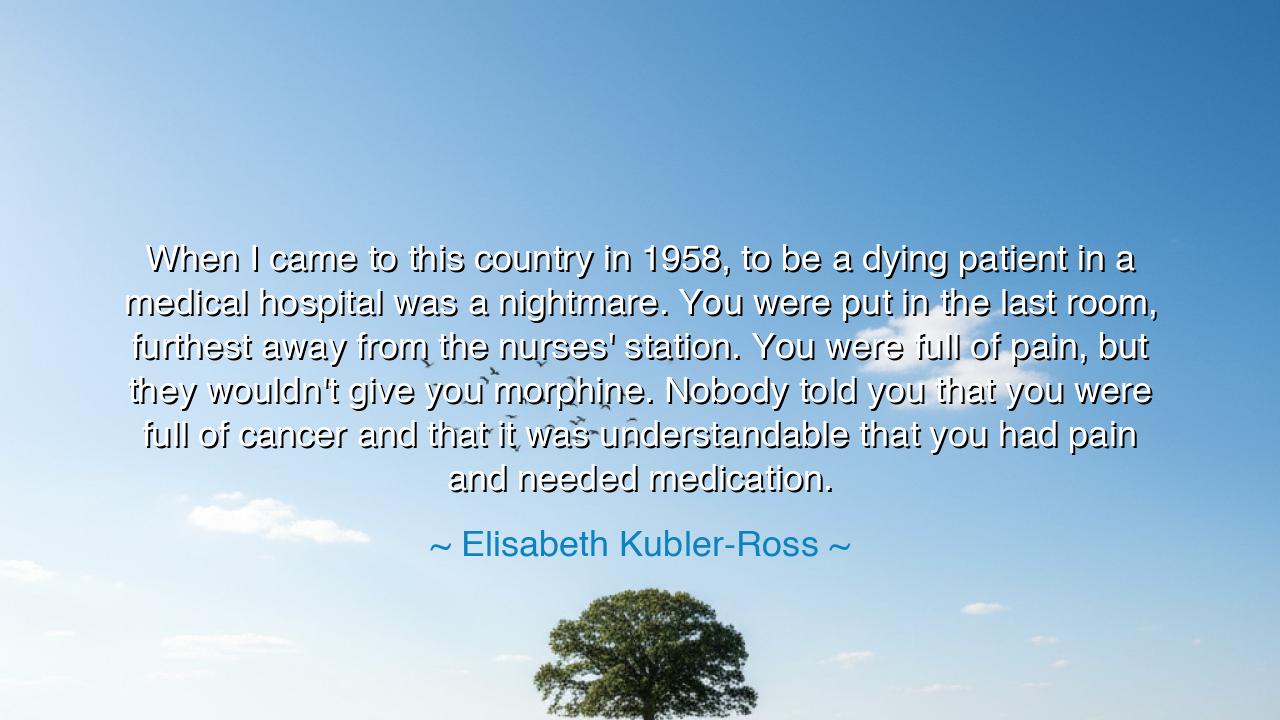
When I came to this country in 1958, to be a dying patient in a
When I came to this country in 1958, to be a dying patient in a medical hospital was a nightmare. You were put in the last room, furthest away from the nurses' station. You were full of pain, but they wouldn't give you morphine. Nobody told you that you were full of cancer and that it was understandable that you had pain and needed medication.






Elisabeth Kübler-Ross's words, "When I came to this country in 1958, to be a dying patient in a medical hospital was a nightmare. You were put in the last room, furthest away from the nurses' station. You were full of pain, but they wouldn't give you morphine. Nobody told you that you were full of cancer and that it was understandable that you had pain and needed medication," stand as a lament for the suffering of the human soul, which, through the ages, has faced both physical and emotional pain without the balm of compassion. In this reflection, she paints a vivid image of the historical treatment of the dying, trapped in a world where both the body and spirit were abandoned in their darkest hour. It speaks to the powerlessness of those in their final days and the silence with which society once allowed such suffering to continue.
In the ancient times, the dying were often treated as if they had already passed beyond the reach of empathy and care. In Greek philosophy, the concept of death was often viewed as the final release from suffering, and for many, it was treated with a certain coldness—yet there were those who sought to understand it with tenderness. Socrates himself, in his last moments, exemplified a peaceful acceptance of his fate. Yet, the lack of compassion Kübler-Ross speaks of, where people in agony were disregarded and isolated, stands in stark contrast to the thoughtful respect given to death in many ancient cultures. In her experience, the dying were left to face not just the inevitability of death, but the loneliness of it, denied the comfort of compassion, and even basic care.
The pain she describes is not merely physical, but emotional—an alienation that resonates across the ages. The historical treatment of the ill, especially those at death’s door, has often been one of fear, ignorance, or disregard. In medieval Europe, the concept of mercy for the dying was often intertwined with religion, where the poor and sick were sometimes seen as a burden to society, left to suffer in silence, and condemned to endure their fate without aid. Only in more modern times did medicine and compassion begin to evolve, with figures like Florence Nightingale, whose work transformed the treatment of the ill, ushering in the understanding that care—and not just cure—was necessary for the patient’s dignity.
Kübler-Ross, with her poignant recollection, was one of the pioneers who, in her own way, reshaped the conversation surrounding death. As a psychiatrist, she had the courage to give voice to the pain of those abandoned by the medical system. Her work, especially her book On Death and Dying, introduced the world to the five stages of grief, but her greatest contribution was the humanization of death. She championed the idea that, rather than being hidden away, the dying deserved to be treated with compassion, dignity, and truth. She believed that acknowledging the pain of the terminally ill—both their physical and emotional suffering—was the key to easing their transition, not just medically, but spiritually.
A modern example of her teachings can be seen in the hospice care movement, which seeks to bring comfort, rather than just treatment, to the dying. It is a testament to her legacy that we now approach death with a focus on alleviating suffering, not just through medicine but also through empathy and understanding. In this light, Kübler-Ross’s words are not merely a critique of the past, but a call to action. They remind us that compassion should be at the heart of all medical care, especially for those nearing the end of life. The lessons of the ancient world, which often left the dying to face their fate in solitude, are being rewritten by the wisdom of those like Kübler-Ross, who challenge us to see the suffering of others and meet it with love.
There is an essential lesson here for all generations to heed: the suffering of the human spirit and body is not to be ignored, nor is it a fate to be feared. It is a journey, one that all must take, but it is a journey that we can walk with others. It is not enough to simply acknowledge that pain exists—we must commit ourselves to easing that pain, wherever we encounter it. To treat the dying with respect, to address their pain, and to provide them with comfort in their last days, is a gift not only to them but to ourselves as well. For in such acts of compassion, we remind ourselves of our shared humanity.
As we reflect on Kübler-Ross’s powerful words, let us ask ourselves: How do we treat those who suffer? Are we ready to offer the compassion and care that each soul deserves in their final days? The lesson is clear: pain should never be met with neglect, and death should never be faced alone. May we rise to the occasion, learning from the past to create a future where all lives, even in their final moments, are honored with the care and respect they deserve. And may we, like Kübler-Ross, never turn away from the suffering, but embrace it with the light of understanding and the warmth of compassion.






AAdministratorAdministrator
Welcome, honored guests. Please leave a comment, we will respond soon